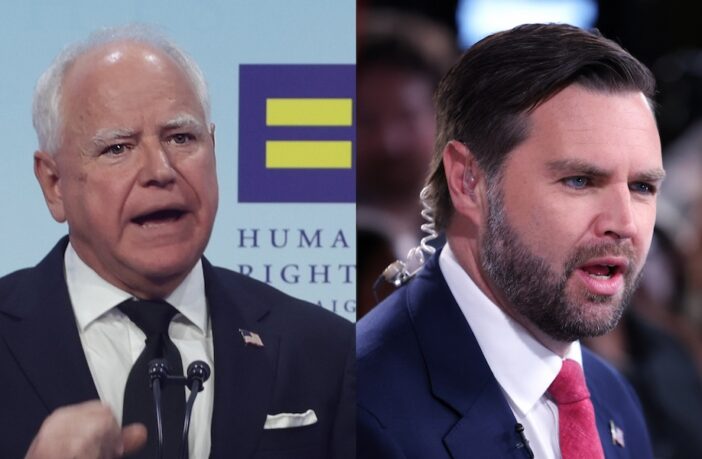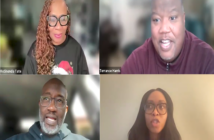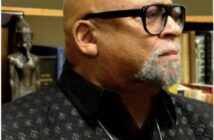In possibly the final debate and the only vice-presidential debate of the 2024 election, Republican JD Vance and Democrat Tim Walz attempted an echo of former President Donald Trump and Vice President Harris’ debate. They sparred over abortion access, border policies, the housing crisis and the future of our democracy.
Vance, a senator from Ohio, gave a buttoned-up performance, often agreeing with his opponent and tabling previous comments made regarding women and immigrants. Walz, the governor of Minnesota, persistently criticized the economic policy of the Trump administration while taking the heat on the Biden administration’s take on immigration. Each candidate empathized with Americans over plaguing natural disasters like Hurricane Helene, fears over unrest in the Middle East and high prices under a crushing economy–now in further peril thanks to a massive dockworkers strike.
On these fronts, both candidates showcased their distinct political philosophies. Vance emphasized an America-first approach with a middle-class upbringing as his backdrop. On the other hand, Walz advocated for progressive policies, like the need for gun control and a strong assurance on climate change.
The debate highlighted the stark policy differences, yet a similar passion between the two, setting the stage for the final stretch of the presidential race. These are the takeaways.
Immigration remains a top concern.
Much like Trump, Vance’s stance on numerous policies is tied back to immigration, which continued to dominate the conversation during this debate. Vance claimed that an excess of guns was being brought across the border illegally, fentanyl was being brought across the border and that undocumented immigrants were to blame for high housing costs and lower wages. He doubled down on Trump’s promise to finish building a border wall and to instill a tough border policy.
Walz took the opportunity to commend the Biden administration’s crackdown on opioid deaths over the last 12 months. He defended Harris’ border policy, calling it the “fairest and toughest bill on immigration.” He accused Trump of dehumanizing migrants, particularly those who received criticism over Trump’s claims that migrants were eating pets in Springfield, Ohio, during the presidential debate against Harris.
Both campaigns believe they have a strong economic plan.
Walz came equipped with attacks against Trump’s response to COVID-19 and the subsequent economic fallout. When asked how Harris’ plan would be paid for without ballooning the deficit, he said Harris would ask the wealthy to pay their fair share while attacking Trump’s corporate tax cuts. When discussing the childcare crisis, Walz highlighted policies passed in Minnesota on paid family medical leave, emphasizing Harris has adopted similar policies.
Vance–again, like Trump–claims Harris should have implemented her economic policy while in position as the vice president, who is unable to do so in that capacity. He touted Trump’s plan and how it would increase take-home pay for American workers.
Walz and Vance have different takes on the Affordable Care Act.
When asked to elaborate on Trump’s “concepts of a plan” to replace the Affordable Care Act, or “Obamacare,” Vance declined to comment. However, he further pushed the notion that Trump worked to save the ACA, a stark departure from the reality that Trump attempted to repeal it the moment he took office in 2017. While both candidates believe in the need for an improved healthcare marketplace, neither commented on how they would achieve it.
Walz praised Harris’ efforts to expand affordable healthcare and bring down prescription drug costs, as enrollment in federal healthcare grew to 21.3 million in 2024. Vance has previously said that separating people into “risk pools” is the best way to give the public more choice about their healthcare plans.
There were polarizing opinions on gun control.
As a gun owner himself, Walz made it clear that concrete change was needed to curb gun violence in schools. He emphasized background checks and public safety courses. He also said he believes whether parents being held responsible in school shootings should vary by case. Walz made it clear that those on the opposing side did not support legislation.
In a shocking statement, Vance said he believes gun violence in schools could be curbed by enforcing additional security measures in schools, while little was said about how kids obtain guns. He did mention he believes guns were being brought across the border illegally by immigrants.
Democratic integrity was called into question.
Vance made several problematic claims when asked about our democracy. When asked about Jan. 6, he said social media censorship was “a bigger threat to democracy” than anything in the past 40 years. When asked if Trump lost the 2020 election, he deflected, saying he’s “focused on the future.” He also declined to comment on if he would challenge the results of the 2024 election.
When asked if Americans should trust him despite an unearthed report that contradicts his claims that he was in Hong Kong during the 1989 Tiananmen Square protests, Walz said he misspoke. “My community knows who I am. They saw where I was at,” Walz said at the debate in defense.



